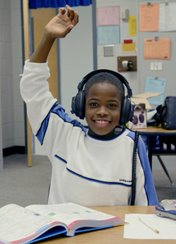Beyond FAIR ACCESS: Recording for the Blind & Dyslexic

It’s hard to imagine not being able to read. I was always the kid who read everything in sight (and yes, got teased for being so brainy; is it any wonder I grew up to be a writer?), and my daughters seem inclined to take after me in that respect. Success in so many areas depends greatly on the simple ability to read, and so often we take that ability for granted. Imagine being a fourth-grader who struggles in school not because she doesn’t want to learn, but because words on a page simply don’t make sense. For students of all ages who strive to learn despite reading difficulties, there’s Recording for the Blind & Dyslexic, “the only nonprofit organization in the country recording textbooks for students of all ages who are blind, print-impaired, or physically challenged.”
Established in 1948 in a makeshift studio in the attic of the New York Public Library, RFB&D is now headquartered in Princeton, NJ, with more than two dozen offices located across the country. I was at the Denver office this morning to participate in the Rocky Mountain Unit’s annual read-a-thon with other Colorado authors. Eight studios buzzed with reading authors and our volunteer engineers who helped guide us through the process of recording portions of assigned books. While a handful of personnel man the office, most of the people who make this program work are volunteers. Today’s list of volunteers included Helen Thorpe, wife of Denver Mayor John Hickenlooper, as well as former Colorado governor Dick Lamm, best-selling authors Stephen White and Marne Kellog, and Denver Poet Laureate Chris Ransick. While I didn’t exactly hang out with these folks today, it was fun to know I was participating with them in such an important project. Staff members of the Rocky Mountain Unit of RFB&D were certainly busy, with 55 authors scheduled to read from early morning into the evening in celebration of the unit’s 55th anniversary.
Just a few years before the Rocky Mountain Unit was established, the founder of RFB&D, Anne Macdonald, set up shop in that studio in the New York Public Library in order to record books for servicemen who’d lost their sight during combat in World War II. Many of these young men wanted to go to college on the G.I. Bill, but needed a lot of help to make that dream come true. Anne Macdonald and her volunteers made a huge difference in their lives and, subsequently, in the lives of thousands of students through the years. Go here to read just three stories of dramatic life changes attributed to RFB&D. I can’t help but marvel at the strength of the people highlighted in such stories as well as the fact that simply reading about them is such a joy. While reading in general has always been a treat for me, through RFB&D I’m finding that reading to help others can be even more enjoyable.








2 Comments:
What a great program! Being Dyslexic, I can certainly see the benefit in what they offer. Thanks, as always for bring attention to programs like this.
You're welcome, Susie! Thanks for stopping by.
Post a Comment
<< Home